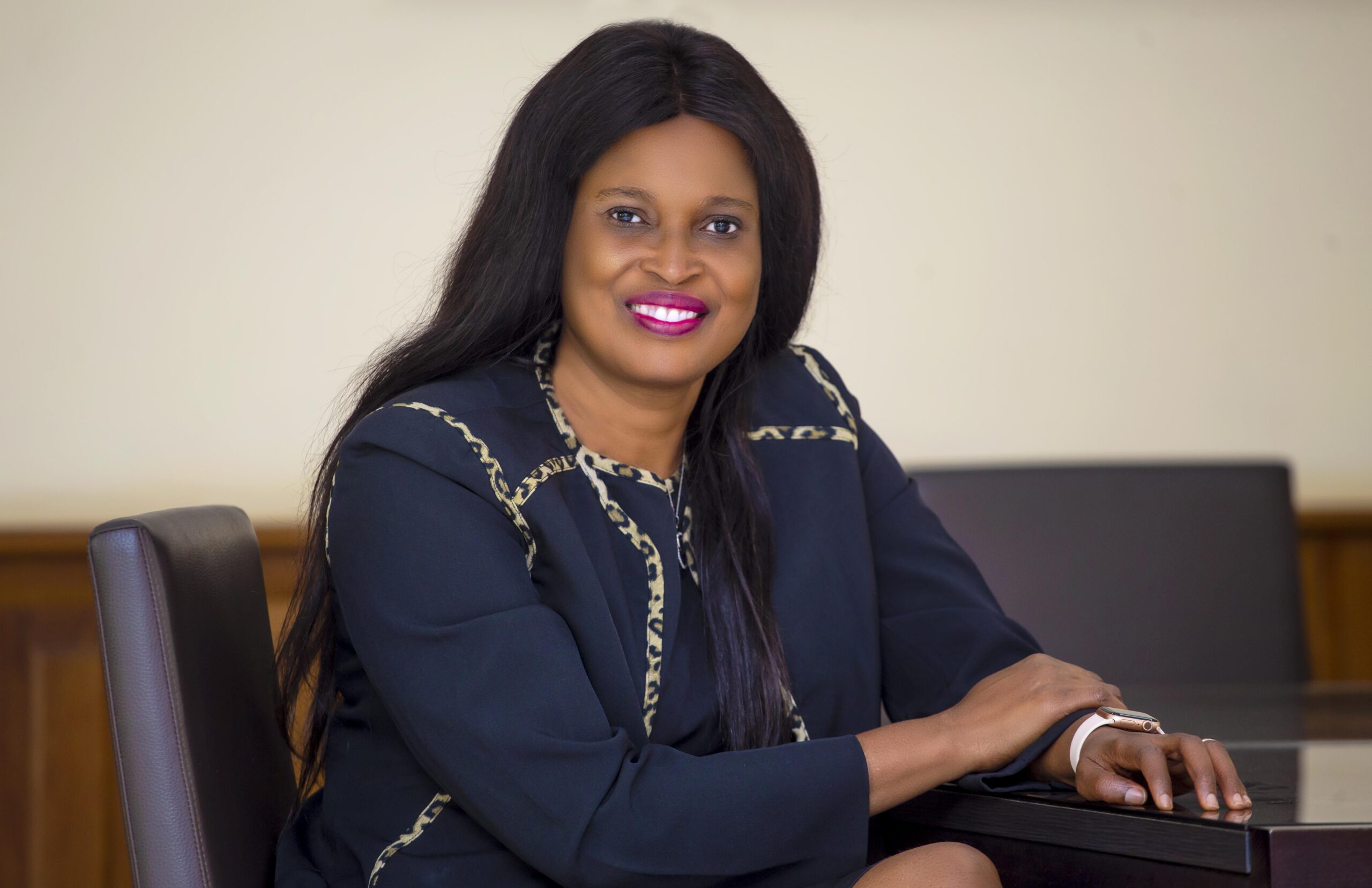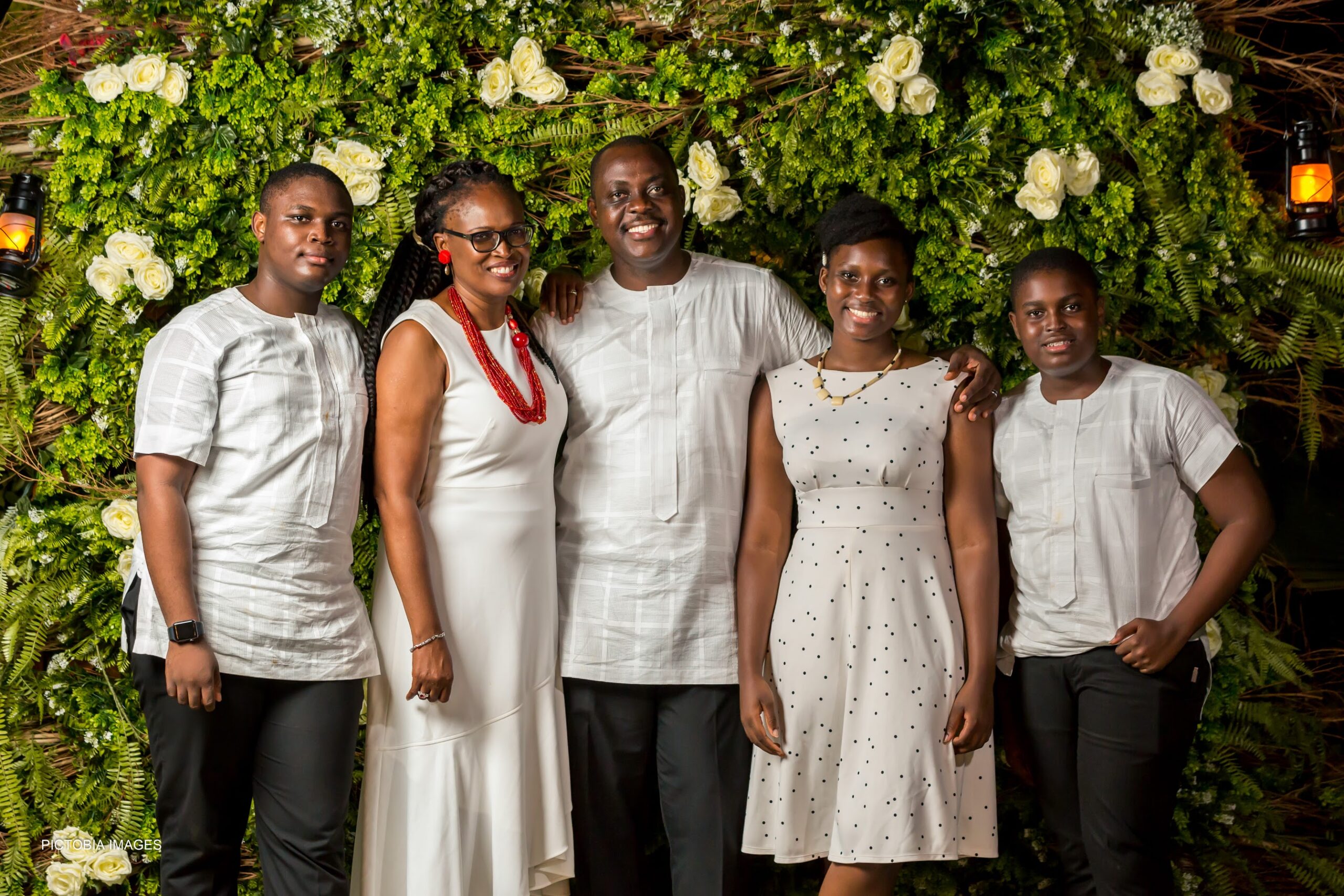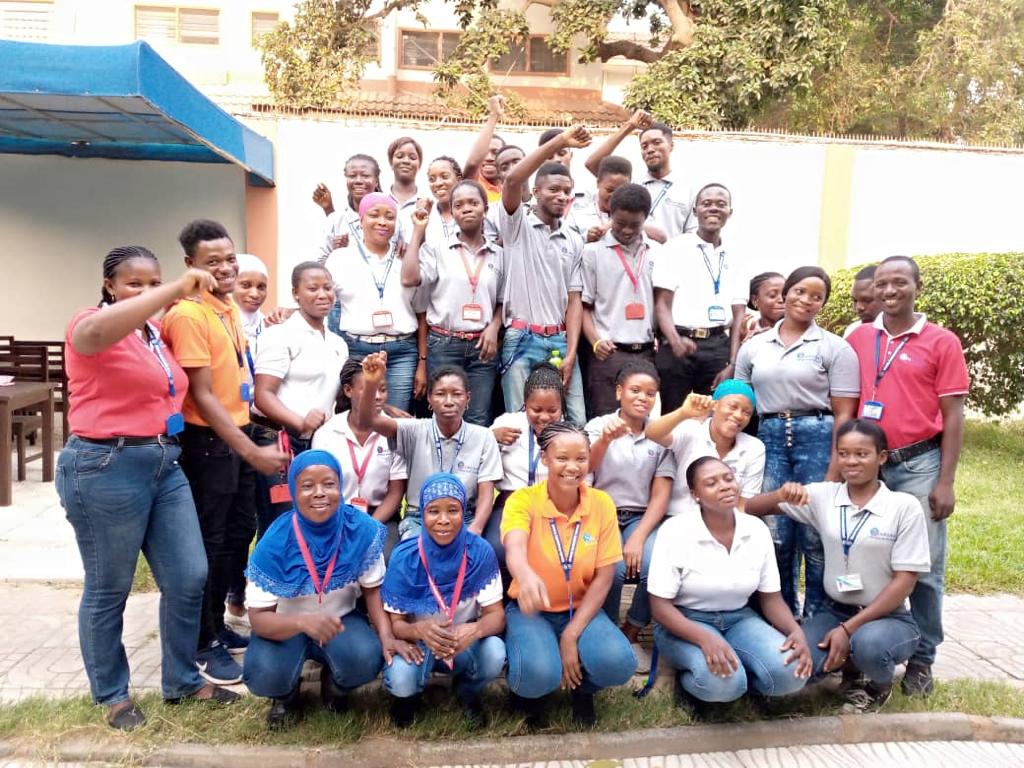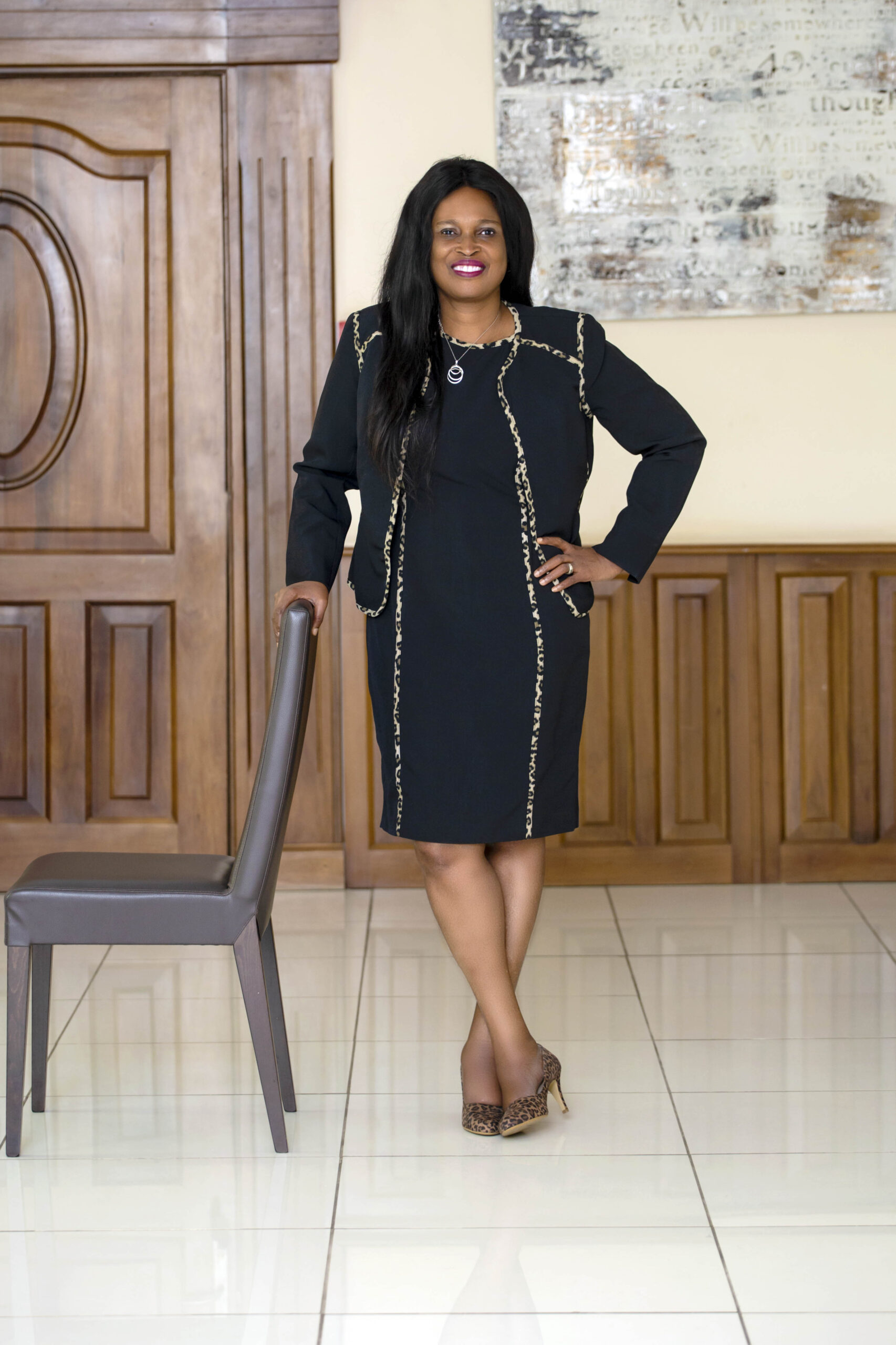Many like to wear their accounts of perseverance, sometimes ever so slightly exaggerated, like a badge and quite understandably so. For others, their unassuming approach betrays minds and bodies full of scars from the battle, that is life. Both approaches are valid and neither undermines the depth of their experience.
From having her scalp scalded to ensure her mother’s business was intact for the next trading day, to earning a post graduate degree in Finance, then moving on to start up a cleaning services business from scratch, and to grow it to be the first on the continent to be certified by ISSA (International Sanitary Supply Association), the global cleaning industry association, we are introduced to the riveting story of Mrs. Dinah Owusu-Kissi, the Managing Director of Spaklean Limited.
Background and early life
Born the second of six children in the port city of Tema, Dinah felt the sense of a tightly knit family bond from an early age. With it, came the weight of caring for her younger siblings. Her childhood, as she describes it, was characterized by a lot of family time, most notably in a backyard garden as well as a lot of time dancing with the family, a practice which she has carried on to adulthood.
Tema Republic Road School
Dinah recalled being skipped nursery school and kindergarten and was thrusted directly into class one, an experience she remembers all too well, as she struggled to keep up to speed. This, she says, saw her placed in position number 33 out of 36 in her first term and by the final term, she made marginal progress, ending the academic year at the 31st position.

Concerned about her progress but acutely aware of her innate abilities, her father employed the services of a tutor, particularly for Mathematics and English. The investment paid off handsomely as Dinah finished in the 6th position for the very next term and maintained a position between 1st and 4th until class five.
Datus Preparatory School
Upon the recommendations of family friends and based on the impressive performances, Dinah and her siblings were transferred to the privately-owned Datus Preparatory School in Tema. She recalled that the move got off to a rocky start as she was taken three years back – from class six to three; due to concerns about the quality of the education gained in public school. This happened without any assessment.
Life during childhood was difficult. She had to support her Mum to trade at a very tender age. During the era of frequent curfews that characterized military rule in the early 1980s, she recounts a more somber occurrence.

“On one of those fateful days, when we would roast plantain during the day at the Community Market and in the evenings, corn at the Night Market, using the same metal basin filled with sand, stone and charcoal. We were roasting corn in the evening and the alarm went off for the curfew. At the time, we had several customers in a queue, and lost track of time. We had to pack our things hurriedly and I was carrying the roasting basin which had not cooled down yet.”
“Unfortunately, the pad I used to support my head in carrying the basin was not big enough. As such, whilst running, I could feel the heat pangs on my scalp. At the time, I had two options – I could toss the basin and its contents to the ground or take it home. Then I thought to myself, ‘If I were to throw this down, in the morning, what would my mother use?’ So, I forced myself to take it home. When we arrived at home, I was in tears, and when my mother got to know the reason for my tears, she also broke down crying. It was a traumatic experience.”
But unperturbed by such difficult developments, little Dinah maintained her performances at the top of the academic chain, consistently within the first three positions. In 1984, she sat for the Common Entrance examination and performed excellently in all subjects.
Achimota School
On account of her performance and encouragement by various teachers, including the fondly remembered Ms. Lillylove Oboubi (now Mrs. Adusei), Dinah applied to and gained admission into the prestigious Achimota School. There, she was greeted with a sharp cultural shock as her humble circumstances were introduced to ubiquity of affluence.
For context, she continued to assist her mother in her petty trading, often hawking and selling food items from cassava to roast corn and plantain, amongst others, principally to ensure that there were both food and money for the family. Thus, when her colleagues were attending vacation classes, she had to be at the marketplace selling.
Detailing an event that left indelible impressions upon her, she says, “When I was going to secondary school, I did not have a trunk or a chop box. My mother had to give me her trunk, the one that was given to her when she got married; a very big one and that is where I put everything – my food and clothing. I remember I had only one bed sheet. This trunk had my gari, shito and sugar. However, as was the practice, food was not allowed in the dormitory. Fortunately, I had friends from Datus who opted to put my food in their chop boxes, so that I would not be punished. I felt out of place, and this affected my ego.”
Despite these and other challenges, she displayed her dexterity, winning prizes for academic excellence in Home Management and Local Languages in her first year, boosting her confidence. With the aid of a scholarship from Cocoa Board she was able to go through her secondary education smoothly. Thanks to her grandfather’s cocoa farm.
Despite the strong urge to fulfill her father’s desire to become a medical doctor, for which reason she read science at Ordinary Level in Secondary school, the thought of spending more than six years to fulfill that dream appeared a herculean task, considering her sense of responsibility towards aiding in the upkeep of the family. Encouraged by an older cousin of hers, she was attracted by the prospect of spending three years to pursue a bachelor’s degree in administration with an emphasis in Banking, so she switched from science to business.

University of Ghana
Despite gaining admission into the University of Ghana in 1992, a spanner was thrown in the works as general unrest resulted in a missed year. Academic activities resumed in 1993, and though tuition and accommodation were catered for, the long arm of severely limited financial resources continued, and she recalls that “prior to accessing the students’ loan, there were numerous occasions where I had to sleep on an empty stomach.”
To remedy the situation, Dinah would often have to hitchhike from Legon to Tema, to access food at home. This, she supplemented with the proceeds from the sale of charcoal, particularly during the holidays.
Following a first year that was saddled with financial constraints and difficulty of a switch from science to business, especially with the principles of accounting, she was able to rely on much self-learning to reverse the trend and graduated successfully in 1996 with Second Class Honours.
She subsequently enrolled in California National University for Advanced Studies for Master’s in Business Administration (MBA), with an emphasis on Finance.
Career trajectory
She undertook the mandatory National Service at Unilever, with the expectation of being retained but this did not come to fruition. Upon completion, she applied to and was employed by the Fund Management arm of Gold Coast Securities (now Blackshield and Ghana Growth Fund Company Limited).

After less than a year in the role, she joined new entrant, UK Bond Securities – which focused on Micro, Small, and Medium-sized Enterprises (MSMEs) financing. Dinah admits that the remuneration, which represented a hundred per cent raise, was the primary motivating factor for the move, as it would allow for more support for her siblings.
The company however became insolvent due to rising incidents of non-performing loans, and she proceeded to the erstwhile Bank for Housing and Construction (BHC). In January 2000, that employer would also suffer a similar fate, barely two years after she joined. Recalling the experience, she said “it was a real blow.” After three months, she was employed by Merchant Bank (now Universal Merchant Bank) where she reprised her previous role as a Banking Officer.
Spaklean
Shortly afterward, Dinah relocated to the U.S.A with her husband, Obed Owusu-Kissi, who was on a work transfer, where she began a family. It was during this period that she took the opportunity to upgrade her academic qualification. Whilst there, she also observed the ‘professional’ and ‘dignified’ way professional cleaning services was carried out.
On her return she started a cleaning services business in 2007. The primary motivation was to provide jobs for the myriads of young ones who were seeking for job opportunities and yet had very basic education and no experience. Much inspiration came from her husband, Obed Owusu-Kissi, who is a cleaning freak and William Ocran Kyei who owned a couple of properties that formed the initial cleaning accounts. The challenge was starting everything from ground zero – “I was uneasy. Can I run a business of my own?” she mused.
To get it right, she took a professional course with Cleaning Management Institute (CMI), USA in 2008. That boosted her confidence and to start it on a professional level from the very onset. “I was determined to put cleaning on a pedestal. I spent a lot of time training and educating my team and that has been our corporate culture ever since,” she added.

Seeking business from previous contacts in the corporate space was often met with shock, disbelief, bewilderment, and sometimes scorn. Dinah was not new to such reactions and was unperturbed. On realizing that she was determined in her chosen path and upon seeing results, attitudes began to change for the better. “My former bosses, Dr. Kwame Osei-Wusu and Mr. Isaac Owusu were really supportive,” she remembers.
“Since we had no staff, we had to do it all ourselves. I had a baby who was less than a year old. One time, we were there at the head office of a bank, past midnight, cleaning. I remember vividly, the older children, aged five and three at the time, also joined us in cleaning,” she reminisces. Such was the beginning of the operations of Spaklean.
Talking about challenges in running the business, Dinah highlighted ‘difficulty of grooming and training an unstable team, with very basic level of education and low sense of hygiene, typically from humble environment.
My greatest joy is to see them improve gradually into managerial positions and it is such a delight to lead a team of largely basic school graduates to achieve a global certification programme! Many thought we couldn’t do it, but here we are – the first African country to achieve CIMS (Cleaning Institute Management Standards) certification. I am proud of them’.
From having no staff on its payroll, Spaklean now provides employment to some 600 persons across the country. It has developed a catalogue of dedicated clients, comprising about 55 institutions, providing commercial cleaning services for more than 150 buildings in Ghana, cleaning approximately 130,000m2.
Milestones
Major milestones on the Spaklean journey include:
| 2007 | Incorporation and first Commercial Office Cleaning |
| 2008 | Professional Training for Executive Management – Cleaning Management Institute, USA. |
| 2014 | ISO 22716 – Chemical Manufacturing License |
| 2015 | Launched Corporate Social Responsibility – Sparkling Healthcare |
| 2016 | Membership of Contract Cleaners Association of Ghana (CCAG) and ISSA. |
| 2019 | First International Trade Seminar, at Johannesburg; Commenced CIMS programme |
| 2021 | CIMS certification by ISSA – the first for an Africa-based company. |
Awards and Recognition
Spaklean’s consistent industry-leading performances have seen it win the coveted Best Industry Compliant award (2018), and Health and Safety award (2019) at the CCAG Excellence Awards.
Family
Dinah is married to Obed, who supports her in the operations of Spaklean. Together, they have three lovely children – two sons and a daughter – who are consistently gaining hands-on experience in the operations of Spaklean.
In her own words
On the benefits of trials and constraints: “These sorts of experiences are good because they help you to be resilient. Having things on a silver platter might take this away because life is full of challenges and we must be prepared, one way or another, for its harsh realities.”
On the relevance of cleaning: “As a people, we generally do not respect the role of cleaning, but I believe it is the basic core when it comes to maintaining a facility. It is imperative that corporate bodies make a reasonable budget for cleaning as part of the maintenance of their building. Cleaning preserves the building. Cleaning is core to living, you can imagine what will happen to the human body if left uncleaned! It is a dignified profession, and we intend to ensure this is projected, especially with our staff.”
On taking a professional certification programme for a discipline which many regard as basic: “Having the technical expertise is very important because then, you truly know what you are doing. Cleaning may seem basic, but there is chemistry behind cleaning.

Cleaning chemicals and materials are not just chosen arbitrarily. If you do not know the technical aspects, you will end up destroying finishes of floor and fixtures – causing rusting, fading, scratches and others. There are many times the clients are impressed when you share with them the professional dimensions of selecting the right building finishes (tiles, painting, wallpaper, ceiling finishes etc.), sanitary wares and building designs (incorporating janitor closets, glazing, restrooms, etc.).
“For the past two years, we have worked hard to achieve the CIMS certification. We have worked hard to come to par with the global standards, we have had to review our management structure, policies, operating procedures, and training manuals. It has taken significant investment in training and operation reviews to achieve this certification. Our clients will hold us to these standards, and we are determined to live up to that expectation. We are proud to be professional cleaners.”










